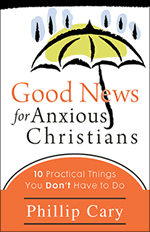Book Review: Good News for Anxious Christians



I wouldn’t have bought this book based on its title. Good News for Anxious Christians

sounds like another Christian living book. Nothing against those books, but I’ve stopped reading most of them. And I sure don’t need another one in my library.
But the subtitle drops some hints that this isn’t just another one of those books. “10 Practical Things You Don’tHave to Do” makes it sound like a practical how-to book, until you think about it. “Don’t have to do.” This is a book that tells you to stop doing some practical things, things that are not found in the Bible, things that are making you anxious and weakening your faith in Christ – things that are taught in many of our churches.
In other words, this is a book that wants to rid you of practices that are rooted in bad theology. I knew this book would be different as soon as I began reading the preface:
I suppose in some ways this book is a stealth attempt to preach the gospel, disguised as an attack on what I call “the new evangelical theology.” So let me give away what I’m doing right away, so no one will be misled by the disguise and think the whole purpose of the book is negative.
I’m trying to preach the gospel of Jesus Christ to Christians. I’d like us all to be free to rely on the gospel rather than to put our trust in a supposedly “practical” ideas that are actually doing us harm.
What are some of the practical ideas that he debunks? Ones that are surprisingly common: that we should listen for the voice of God inside; that we need to let go and let God; that we need to find God’s perfect will for our lives; that we should always experience joy; that we should focus on what we should do (application) more than on what Christ has done. We’ve been trained to accept a set of practical ideas or techniques in the Christian life. They “work,” but not as they should. Phillip Cary, the author, helps us understand that they’re not biblical, that they’re weakening our faith, and that they’re making us anxious.
The alternative? Cary continually draws us away from ourselves and back to Christ and his gospel. “What the gospel of Christ does is give us Christ, and that is enough,” he writes. “It’s our job to keep preaching the gospel of Christ to one another.”
This is a great book for every believer, but it’s also a great book for pastors. It helps pastors understand how we’ve been sucked into a focus on techniques and practices that are making us anxious. Chapter 9 on preaching is called, “Why ‘Applying It to Your Life’ is Boring, Or, How the Gospel is Beautiful.” This chapter alone is worth the price of the book, and every pastor should read it.
Cary leads us to the Sabbath rest that we find in Jesus. It’s a rest that is about what we don’t do, about what has been done for us by Him. “Every time we turn to Christ in faith,” he writes, “it is like a moment of Sabbath, a little foretaste of eternal rest and glory.” This continual turning to Christ is the antidote to our anxiety, and is truly good news for anxious Christians – and pastors.
This book isn’t what I expected. It was far more. If you’re looking for a good example of stealth-mode gospel-centered teaching, this is it. You may find yourself less anxious, and more enraptured with the beauty of Christ, who truly is everything that we need.
Tomorrow I’ll be posting an interview with Phillip Cary about this book.







